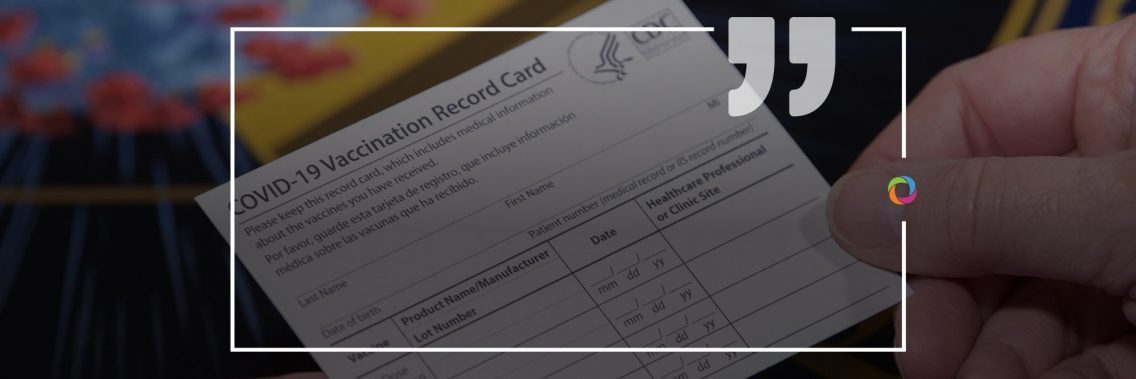Following several lockdowns and measures to fight the COVID-19 pandemic, there seems to be one single light at the end of the tunnel: the vaccine. In 2021, among governments and those in the travel sector, a new term has become more popular than ever: vaccine passport. Recently, the European Commission presented a proposal to create a Digital Green Certificate to facilitate the safe free movement of citizens within the EU during the COVID-19 pandemic. However, the requirement for proof-of-vaccination certificates for everything from travelling to attending public events has engendered much discussion regarding the infringement of human rights. Let’s see what experts have to say about this.
Could proof-of-vaccination certificates infringe human rights? Discuss your position.

“A proof-of-vaccination certificate is important, but the aim of the certificate should be to improve and protect health, not create a control system that can infringe on the liberty and dignity of individuals. The following four different health aspects as human rights are therefore important to consider: a) Availability of vaccinations and certificates without discrimination of anyone and based on scientific evidence and informed consent. It is also important to provide complementary solutions such as COVID-19 tests or medical certificates that confirm a person with a certain medical condition has been advised not to receive immunization; b) E-certificates are ethically complicated. These must be organized with full respect to the individual’s integrity and also accessible from a physical, economical, and information perspective; c) Actions must be acceptable, meaning respecting medical ethics as well as being sensitive to gender and life-cycle requirements. It is important that the control of certificates does not cause acts of discrimination and exclusion; d) The quality perspective demands that we continue to apply physical distancing, avoid crowds and wear face masks and accept vaccinations while awaiting the long-term effects of the COVID-19 vaccines.”

“Enforcement of mandatory proof-of-vaccination certificates could infringe upon human rights. While on the face of it, human rights enjoy presumptive inviolability, in practice this is not always the case. Human rights are subject to limitations. The inquiry as to whether these limitation(s) are justifiable rests upon the application of strict proportionality and necessity tests, the parameters for which are subject to individual member states’ laws and regulations. It has been apparent over the last year that, in the face of a global public health emergency, societal welfare does trump individual human rights. We have all experienced the imposition of state-sanctioned COVID-19 related measures. The enforcement of measures involving social distancing, social gatherings, quarantine, lockdowns, and travel bans deployed in most countries has somewhat breached and restricted human rights. These measures are put in place to safeguard the right to life and protect the right to health. What will be tricky in terms of enforcement of proof-of-vaccination certificates is balancing global public health with human rights when some countries have access to vaccines and others do not.”

“Human rights law includes satisfactory guidance to deal with the limitation and derogation of human rights during public health emergencies. As the Ebola crisis evidenced, the clarification of the links between efforts to protect the health of the public whilst securing human rights was needed. The surge of the COVID-19 virus and the millions of deaths attributed to it have again prompted questions about international and national bodies imposing measures to prevent and protect the population, sometimes at the expense of freedom of movement or other human rights. Both practice and case law have shown that human rights risks have been set aside when they clash with the protection of public health. In this, it is key to use the concepts of ‘balance’ and ‘proportionality’ of the measures proposed. National health security is a decisive factor when adjudicating a balance between various human rights and public health measures that may potentially infringe on the civil and political rights of individuals, including their rights to privacy and freedom of movement. The Committee on Economic, Social, and Cultural Rights, does not clearly indicate which interventions are to be prioritised but the UN international human rights framework includes satisfactory guidance to deal with the limitation and derogation of human rights during public health emergencies. For example, it includes tests that ensure that such limitations and derogations to human rights are ‘in conformity with human rights’ and procedural safeguards. Regulations are to be ‘fully compatible with international human rights standards’ and these standards need to be included in the emergency briefing of public health officials so as to ensure that these standards are applied in practice. This all applies when public health emergencies are declared by the World Health Organisation (WHO) Director-General according to WHO International Health Regulations. To answer your question, the proof of vaccination may well not infringe human rights if balance and proportionality are respected as per above.”

“Prior to the COVID-19 pandemic, it was a norm, and it continues to be a norm, to have proof of vaccination against e.g., yellow fever to enter some countries with the safety of the person and public health being the concerns. One is reminded that the confidence in requesting proof-of-vaccination is based on the fact (fallacy) that over the years, it has come to be believed that such vaccines have become available and accessible to all. The same cannot be said with the current situation of the COVID-19 pandemic vaccine. There is still inequitable distribution and access to the vaccine by all, with uncertainty as to when the poor countries will receive the vaccine. Understandably, the concern is public health but there is great potential for discrimination on the basis of the socio-economic status of individuals and/ or one’s country of origin which is an infringement of the right to equality and non-discrimination of individuals. Up to a point where we are certain of the distribution and accessibility of the vaccine for all, I believe it is still premature to speak of proof-of-vaccination without discriminating against the poor of our society and inherently denying them opportunities to attend public events and/or travel.”

“While proof-of-vaccination certificates might accelerate a return to a pre-COVID-19 existence for some of us, this will not be the case for individuals and communities at risk of being left behind due to political, geographic, economic, and socio-cultural barriers. If access to public spaces, employment and education opportunities, as well as participation and movement, are contingent on a compulsory immunization, will those who do not have access to the vaccine be marginalised, excluded, or face discrimination? In particular, I am thinking about women and girls who are survivors of violence, displaced people, indigenous and ethnic groups to name a few. In addition to discussing access to vaccines, further thinking is also needed on other issues such as protecting the privacy of individuals, agency and a person’s right to choose whether or not to be vaccinated, and how to ensure that groups deemed to be vulnerable are able to participate in and influence decisions. Answering these questions will also mitigate the risk of losing some of the hard-earned gains made in the area of equality and social inclusion.”

“We know proof-of-vaccination certificates can infringe on human rights because restrictions around other forms of legal identification already pose human rights infringements. The inability to obtain legal ID prevents millions from attaining basic human rights including accessing government services, traveling, securing adequate housing, getting a job, or participating in political life. Women are most at risk: the World Bank estimates that 1 in 2 women in low-income countries are unable to attain ID, often due to a lack of birth certificates or other vital documents. The ability of states to use ID systems to restrict the rights of vulnerable populations is also well documented: in the US, voter ID laws are used to suppress the right of poor people and people of color to vote; in China, the hukou address registration system codifies inequality, allowing the government to restrict people’s movement and access to livelihoods. Preventing human rights violations from occurring with proof-of-vaccination certificates requires two things. First, expanding vaccination programs in a way that ensures the world’s most vulnerable people have free, safe, and attainable access to the COVID-19 vaccine. Second, a proof-of-vaccination system that provides easily verifiable certification but also protects citizens’ data and personal information.”

“It has long been debated whether proof-of-vaccination certificates infringe human rights. The requirement of governments to impose certificates of proof has been resisted particularly strongly in the United Kingdom. This is a consequence of the enforced registration of citizens in some countries in the early part of the twentieth century. Even today, no UK citizen has a state ID card, not every UK citizen has an international passport and some don’t possess even a driving license. However, this dreadful pandemic has changed everyone’s perspective. We all wish to escape lockdown and increasingly it is becoming apparent that certificates of vaccination are essential. Yet paper cards are in no way secure. They can be lost and they can be copied and they can be forged. Criminals will have a field day if we rely on traditional paper certificates. Cards and paper certificates are not the answer. We need a secure form of certification and by secure the implication is that the data must be owned by the individual and not by a global or national organization.”

“Some outspoken human rights advocates affirm that the requirement for proof-of-vaccination certificates, even immunization, violates fundamental human rights. They argue that men are born and remain free and equal in rights. Quite the contrary, this obligation has several positive impacts far from infringing on human rights in my unbiased opinion. First, compliance with this public health requirement by the competent authorities reinforces the massive efforts to fight the pandemic. It has a common purpose of protecting the human right to safety. Second, proof-of-vaccination certificates help to mitigate the trends and even curb the spread of COVID-19. They can give a rough idea of, thus measure, the number of people who have been vaccinated. Finally, this prescription is aimed at the generalized well-being of the world. Whether one is for or against it, it ensures a climate of security by eliminating potential large-scale contamination risks, higher during public events. To conclude, Montesquieu wrote, “If I knew something useful to my country, and harmful to Europe, or useful to Europe and harmful to Mankind, I would regard it as a crime.” Proof-of-vaccination certificates are beneficial to citizens and countries of the world and by no means infringe on human rights.”
Check out more than 260 job opportunities in the Human Rights sector here.

